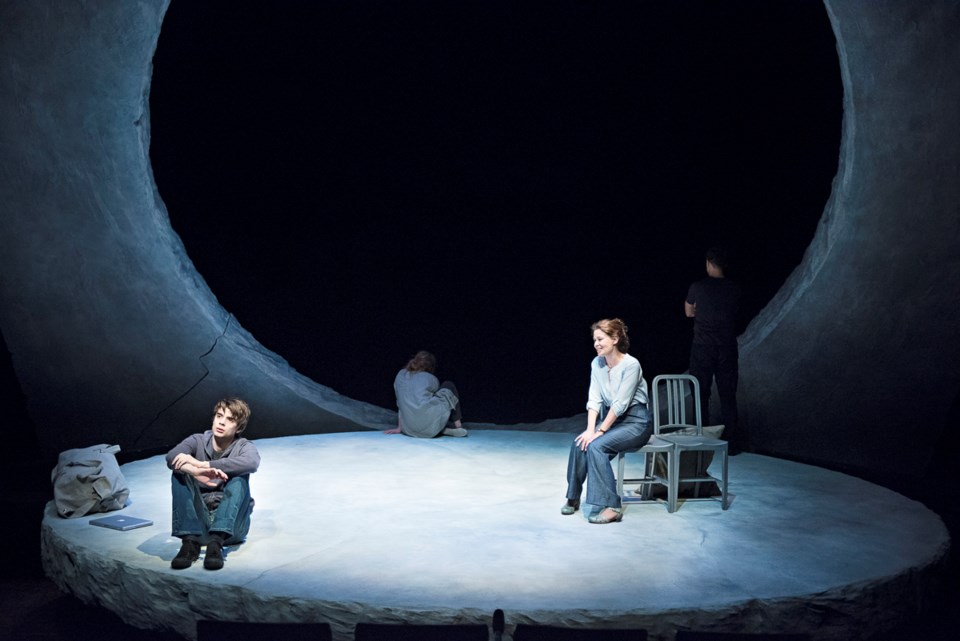Something that can be said about depression and mental illness: they aren’t choosy. They can just as easily strike bright young adults from well to do, loving families as those born to addicted or uncaring parents. Old, young, male or female, everyone is susceptible. Unrecognized, mental illness can — in the worst-case scenarios — result in death-by-cop. And love is not always enough to keep the dark forces at bay.
We wait a while for a new play by Victoria-based Joan MacLeod; she’s a professor in the writing department at the University of Victoria, and she also writes poetry, prose and TV scripts. But when a new play emerges from this award-winning Canadian playwright, it’s always worth the wait.
MacLeod writes character-driven plays, which is not to say they are without plot. But the plot arises from the characters — their hopes and dreams, failures and successes and, most often, their fears. The Valley focuses on four characters: teenaged Connor (Daniel Doheny), his mother Sharon (Kerry Sandomirsky), a policeman Dan (Robert Salvador) and his wife Janie (Pippa Mackie).
Thoughtfully directed by Mindy Parfitt, The Valley strikes such a fine balance that MacLeod makes it impossible to lay blame on any one person. Connor’s mother, a well educated, single-again woman almost loves her son to death.
She’s so overwhelmingly optimistic about Connor’s future that she doesn’t see his increasing anxiety. As Sharon, Sandomirsky exudes smiling, maternal affection but also her character’s smothering effect on Connor. And when we see Sharon go on the offensive, we almost don’t notice that she doesn’t have all the facts. She’s complicated.
First on the scene when Connor creates an incident at the Joyce-Collingwood SkyTrain Station is Dan, a cop with a “s*** list” of people he has to deal with: crackheads, hookers, addicts, dealers, strippers, Canucks fans, jumpers, bikers and more. Dan is not a bad cop, but he’s ill-equipped to handle mental illness on the street as well as at home. Salvador, as Dan, also strikes a delicate balance: it’s easy to dislike his uncaring, macho manner, but his life isn’t easy. He’s complicated, too.
While the four characters are very balanced, our hearts bleed most for young Connor and Janie. Doheny makes a gangly, lovable but lost Connor. All arms, legs and nervously twitching fingers, Doheny’s Connor is every anxious teenager you have ever known.
As new mother Janie, Mackie shows us how devastating being home alone with a new baby can be especially when married to a largely unsympathetic husband.
These are all good people trying to do their best. These are people we know. Most importantly, MacLeod shows us these are people much like those we love but that we may be too busy to notice are losing ground.
While the characters are very real, Amir Ofek’s set design for The Valley — the title of the sci-fi novel Connor is writing — is sci-fi inspired: a steeply raked, circular “concrete” slab over which looms, at about 45 degrees, a huge, stage-filling “concrete” orb within which there is a large hole, symbolic perhaps of the black hole that threatens to suck in Connor and Janie. Projections, by designer Jamie Nesbitt, are colourfully splashed against this backdrop. The performers remain on this stage throughout, sometimes moving into or sitting in shadow, at other times coming forward. Itai Erdal dramatically lights this spare but very impressive set.
The Valley does not offer a fun night at the theatre. The play takes a compassionate but critical look at how much we expect from our police officers who are insufficiently trained to handle the crises they meet all day, every day. If there is a villain in The Valley — and there is — that’s it. If there’s hope — and there is — it’s recognizing the problem and doing something about it.
The Valley is at the Arts Club Granville Island Stage until May 7. For tickets, call 604-687-1644 or go to artsclub.com.
For more reviews, go to joledingham.ca.



